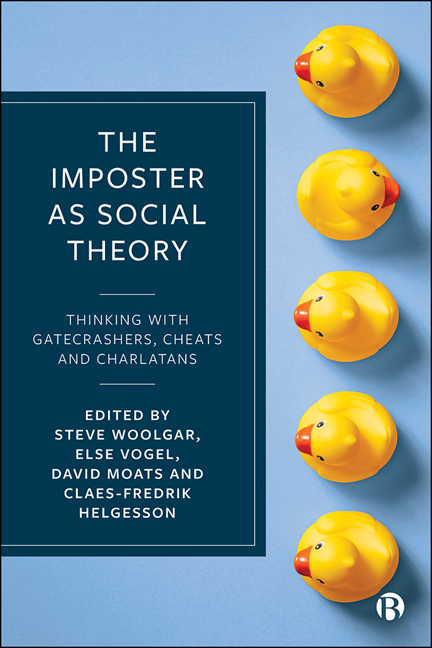Book contents
- Frontmatter
- Contents
- List of Figures and Boxes
- Notes on Contributors
- Preface
- 1 Thinking with Imposters: The Imposter as Analytic
- 2 The Desire to Believe and Belong: Wannabes and Their Audience in a North American Cultural Context
- 3 A Menagerie of Imposters and Truth-Tellers: Diederik Stapel and the Crisis in Psychology
- 4 Learning from Fakes: A Relational Approach
- 5 Imitations of Celebrity
- 6 Natural Imposters? A Cuckoo View of Social Relations
- 7 Conjuring Imposters: The Extraordinary Illusions of Mundanity
- 8 States of Imposture: Scroungerphobia and the Choreography of Suspicion
- 9 The Face of ‘the Other ’: Biometric Facial Recognition, Imposters and the Art of Outplaying Them
- 10 Faking Spirit Possession: Creating ‘Epistemic Murk ’ in Bahian Candomblé
- 11 The Guerrilla’s ID Card: Flatland against Fatland in Colombia
- 12 Good Enough Imposters: The Market for Instagram Followers in Indonesia and Beyond
- 13 Thinking beyond the Imposter: Gatecrashing Un/Welcoming Borders
- 14 Postscript: Thinking with Imposters – What Were They Thinking?
- Index
2 - The Desire to Believe and Belong: Wannabes and Their Audience in a North American Cultural Context
Published online by Cambridge University Press: 22 December 2021
- Frontmatter
- Contents
- List of Figures and Boxes
- Notes on Contributors
- Preface
- 1 Thinking with Imposters: The Imposter as Analytic
- 2 The Desire to Believe and Belong: Wannabes and Their Audience in a North American Cultural Context
- 3 A Menagerie of Imposters and Truth-Tellers: Diederik Stapel and the Crisis in Psychology
- 4 Learning from Fakes: A Relational Approach
- 5 Imitations of Celebrity
- 6 Natural Imposters? A Cuckoo View of Social Relations
- 7 Conjuring Imposters: The Extraordinary Illusions of Mundanity
- 8 States of Imposture: Scroungerphobia and the Choreography of Suspicion
- 9 The Face of ‘the Other ’: Biometric Facial Recognition, Imposters and the Art of Outplaying Them
- 10 Faking Spirit Possession: Creating ‘Epistemic Murk ’ in Bahian Candomblé
- 11 The Guerrilla’s ID Card: Flatland against Fatland in Colombia
- 12 Good Enough Imposters: The Market for Instagram Followers in Indonesia and Beyond
- 13 Thinking beyond the Imposter: Gatecrashing Un/Welcoming Borders
- 14 Postscript: Thinking with Imposters – What Were They Thinking?
- Index
Summary
The art of faking: imposture as successful identity performance
Identity never is something we ‘find’ and then ‘keep’ for good but something we continuously have to work at and work for in changing social and cultural contexts. Rather than a stable entity, identity is always malleable and in flux and needs to be re-invented and stabilized in repeated performances among various groups. The construction of personal identity thus always requires an audience which has to validate the performance as convincing, true and authentic. Identity, in other words, relies on the recognition of the ‘Self ‘ through an ‘Other’. Cases of imposture, first of all, constitute instances of successful performances in which an audience became convinced of, and sometimes enthralled with, a staged identity. We, secondly, can only speak of imposture if such an identity is then recognized as ‘fake’; otherwise we simply continue to believe in it. It is, then, neither the performance nor the resultant identity that mark an imposture as fake but the revelation of the fact that someone appropriated an identity he or she was not entitled to. Imposture, thirdly, often causes a scandal because people feel betrayed and outraged that someone pretended to be a member of a certain group in order to gain status and/or profit. Often, however, people also feel ashamed of their own poor judgement and for wholeheartedly having bought the performance of the imposter. It is the spectre and fetish of authenticity itself that often produces imposture and the audience's need for believable identities.
As the introductory chapter for this volume convincingly argues, imposture is a complex act which raises fundamental questions about symbolic and social orders. Just like the breaking of a taboo, in the end, serves to reinforce the norms of a society at a given time, successful acts of imposture and their later revelation disturb the social order and lay bare its underlying parameters and mechanisms. The more successful an imposture, the greater the uproar at its revelation, because not only the imposter but the audience is being exposed. Imposters not only tell us a lot about how identity is constructed in general but also reflect on the cultural beliefs, desires and stereotypes of their audience at a certain time. Hence imposture, as the editors of this volume conclude, has great analytical potential.
- Type
- Chapter
- Information
- The Imposter as Social TheoryThinking with Gatecrashers, Cheats and Charlatans, pp. 31 - 52Publisher: Bristol University PressPrint publication year: 2021



